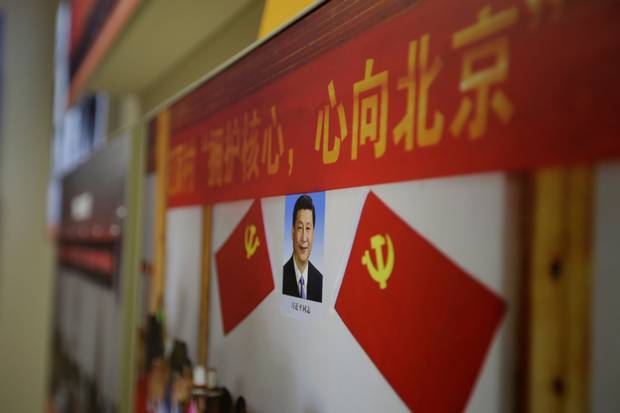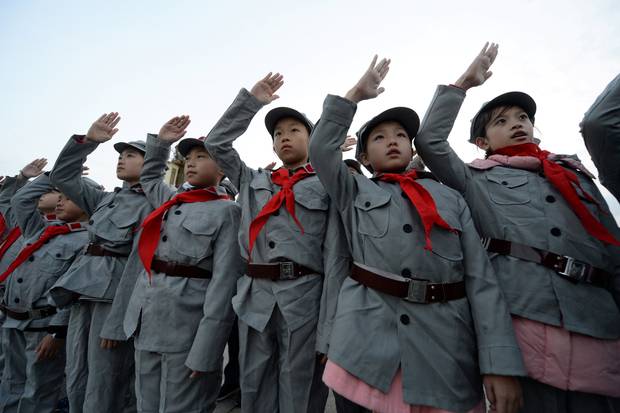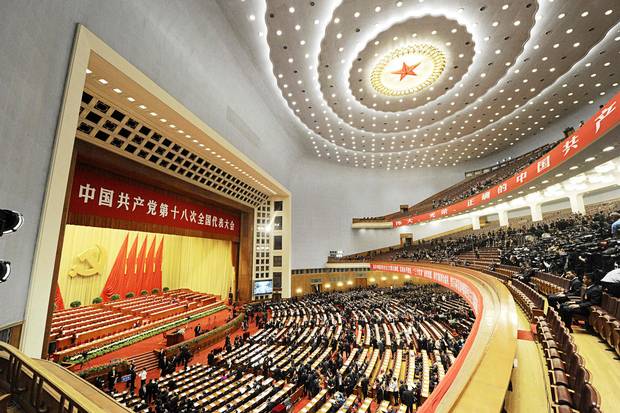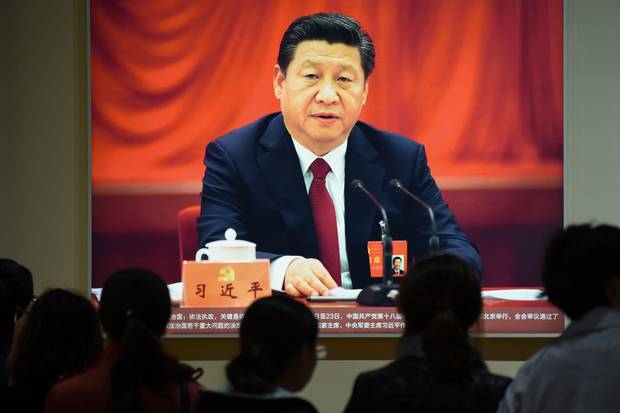When Mr. Xi became General Secretary of the Communist Party of China five years ago, little was known about a man who had spent much of his career assiduously building his résumé in distant corners of the country while his wife, singer Peng Liyuan, grabbed the spotlight.
"Who is Xi Jinping?" writers and world leaders alike asked as he assumed power over the world's second-largest economy.
Mr. Xi was described as an enigma, an ambitious cadre who had navigated a speedy rise through the ranks but whose background suggested his rule, in co-operation with other party elders, would be an undramatic process of easing China toward more political and economic openness.
Singaporean leader Lee Kuan Yew likened him to Nelson Mandela. Richard McGregor, author of a detailed look inside the Communist Party, offered reassurances. "China is far from the days of strongman rule," he wrote. "China couldn't cope with a dictator, and nor could the rest of the world."
Mr. Xi took little time to shatter illusions.
From his earliest days as paramount leader, he has made himself the powerful centre of a wide-ranging effort to bring China's military, people and corporations to heel beneath the authority of a reinvigorated Communist Party.
Far from a diffident caretaker, he quickly earned the labels of strongman and dictator. "Beware the cult of Xi," The Economist warned on one cover. "Xi who must be obeyed," it blared on another.
Detractors accuse him of dragging the country backward. But even those who have abandoned China under his rule acknowledge he has become one of the greatest leaders in modern Chinese history.
Mr. Xi has been elevated to "core" leader of the party, a title underscoring the consolidation of his political and military power as he pursues what he has termed the "China Dream" – and the ideological purity he sees as necessary to attain national rejuvenation. Winning ardent converts to that vision has proven difficult in a country whose well-travelled and well-heeled middle class maintains a fondness for the West.
But as Mr. Xi's first five-year term draws to a close, he is now days from attaining a potent new ability to buttress his new authoritarianism.
This week, the Communist Party elite gathers in Beijing for a congress that takes place just twice a decade to approve a new roster of top leadership. At it, Mr. Xi will have an opportunity to fill many of the party's highest ranks with his acolytes. The party's Central Committee, a 205-person body, is set for its largest turnover since 1969, and "70 per cent of them will be new. Xi Jinping's people will very significantly move to that Central Committee," said Cheng Li, a careful student of China's elite political figures who is a senior fellow at the Brookings Institution.
Mr. Xi is also expected to have a theoretical contribution in his name added to the party constitution.
This is already in many ways Mr. Xi's China. It's about to become more so, as he touts his country's illiberal political and economic systems as achievements worthy of pride.
"Many senior people in the Chinese Communist Party have decided: We learned what we can from the West and now we think we are doing things better than they are," said Anthony Saich, a professor at the Kennedy School of Government at Harvard University.
In Mr. Xi, they have found a man unafraid to carry that banner – a leader who has ignored international outcry over expansionist activity in the South China Sea and quashed dissent at home, silencing those who might dispute the future he is imposing on the country. His leadership is in service of something greater, supporters say.
"Assume the current leadership is moving in more or less the right direction," said Victor Gao, a director at the China National Association of International Studies. "Then having the nation moving together more or less in unity rather than disunity actually generates better results for the whole nation and for everyone in China involved."
Mr. Xi's strong rule has pulled the country away from the corrupt cronyism that stained the party before he took the reins, his defenders argue.
That's not just good for China – "it's also good news for the world," Mr. Gao said. "The world needs a stable China, a capable China – a China led by a leader who is clean, who is disciplined, who is professional and who is very committed to build a better China and build a better way."
Indeed, as a Donald Trump-led United States withdraws from the international sphere, abandoning trade agreements, climate treaties and United Nations agencies, China has assumed a position of rising global influence. Mr. Xi has taken to the stage in places such as Davos, Switzerland, to present China as a like-minded partner in pursuing global goods.
But what the world has in Mr. Xi is also someone who has from his earliest days eschewed the West, emerging from the bloody turmoil of the Cultural Revolution – and the indignities it imposed on his father – determined to be "redder than the red," as a long-time friend once said.
"Unlike any other Chinese leader since the reform era, Xi Jinping has worked on forging a uniquely Chinese national narrative," the Mercator Institute for China Studies said in a new study, "Ideas and ideologies competing for China's political future."
"The terms 'China Path' and 'China Dream' were coined to suggest a strong nation capable of global leadership and of representing an alternative model of governance that sets China apart from market-led capitalism or liberal democracy," the study says.
By some measures, China's economy has already eclipsed that of the U.S. – and that means that for "the first time in a couple of centuries, the largest economy is not Western and will be under a leadership that does not share the same consensual values and political structures as those in the West," Prof. Saich has written.
"When I started out in China in the latter part of the Cultural Revolution, I thought I might live to see a democratic China," Prof. Saich said. "But I don't think there's any way I will live to see that now."

Oct. 10, 2017: A picture shows Chinese President Xi Jinping’s portrait during an exhibition in Beijing displaying China’s achievements for the past five years, entitled “Five Years of Courage and Endeavour.”
JASON LEE/REUTERS

A visitor handles a model of a weapon at a military simulator area of the exhibition.
JASON LEE/REUTERS

Polls have shown a decline in nationalism and an openness to Western values among China’s people, but Mr. Xi has technological tools for enforcing compliance to the state that China’s leaders never had before.
WANG ZHAO/AFP/GETTY IMAGES
On Sept. 26, Beijing opened the doors on a new exhibition, a celebration of its top leader called "Five Years of Courage and Endeavour." In the days since, uniformed soldiers, party officials, high school students and groups of retirees have filed into the city's exhibition centre, passing a large sign as they approach: "We must closely unite around the Communist Party of China Central Committee with President Xi at its core. Together we will push forward the great cause of socialism with Chinese characteristics."
Inside, halls festooned with pictures of Mr. Xi vaunt his achievements in poverty eradication, security and innovation. At the heart of the hall stands a tower of books written by or about the Chinese President, on subjects as far and wide as love and governance.
"I have read most of his works. I think his books have an everlasting significance," said Mr. Wang, 35, a civil servant who gave only his surname. "You can find great value in them – especially the one about Xi's seven years in the countryside. That's worth reading again and again."
Xi Jinping was born into power, the princeling son of a onetime guerrilla fighter who became a top party leader and played a key role in building the Shenzhen Special Economic Zone that would spark broader market reforms in the country.
When his father was purged in the 1960s, Mr. Xi was sent to the countryside along with many other intellectuals who had fallen out of favour. He lived in a cave and, official biographers have said, once jumped into an icy river to unclog a dam.
Tales of his persistence through adversity have become a key part of his narrative. That background has won him broad affection, as has a sweeping anti-corruption campaign and his elevation of China onto the world stage. He is the country's best-travelled leader, racking up more than 570,000 kilometres in air travel over his first term.
"To describe Xi's rule, the key words that come to mind are 'pragmatic,' 'experience-based' and 'showing an air of great power.' He has a great amount of political courage," said Su Hao, a professor in the school of diplomacy at China Foreign Affairs University.
"In a word, Xi just make us proud of being Chinese," said Shi Yongliang, a Beijing tech worker who created the #studyXifanclub hashtag, part of an online effort that began in 2013 to pour online adulation on the President.
"Some people have compared Xi with great emperors of the Han Dynasty. Others see him as the kind of emperor who brings about the demise of their people," said Qiao Mu, a cast-out journalism professor at Beijing Foreign Studies University who left China earlier this year. He himself sees Mr. Xi as "greater than Mao and Deng, in many ways."
Those who have met the Chinese President say he possesses a physical presence of authority, even as he strikes a genial attitude. Former Canadian governor-general David Johnston once asked Mr. Xi what keeps him up at night. "He said, 'Inequalities.' Inequalities of revenue between people in the cities, but also between the cities and and the countryside," said Guy Saint-Jacques, the former Canadian ambassador to China.
"He also mentioned concerns about social unrest. And in a way, when you look at everything he has been doing in terms of tightening up, it shows that he is quite concerned and wants to ensure the survival of the party."
Indeed, Mr. Xi defined himself from an early age, when he ended his time in the countryside. Where others emerged from the tribulations of the era determined to seek release in hedonism or an ideological embrace of the West, he rejoined the Communist Party, famously saying he applied 10 times before he was accepted.
"He is a very sincere Communist Party member," said Akio Takahara, a China scholar who is a senior fellow at the Tokyo Foundation.
Shortly after Mr. Xi became President, a document began to circulate calling on officials to "allow absolutely no opportunity or outlets for incorrect thinking or viewpoints to spread," specifically attacking Western notions of constitutional democracy, civil society and the press.
In the years that followed, lawyers, non-governmental organizations, religious groups and even private corporations have all fallen under heavy pressure to conform to party dictates.
Authorities have placed a firm new hold on all forms of media – even the administrators of cellphone group chats are now being held responsible for the posts of others.
People in China have remained resistant to the ideological exuberance. A study by a Harvard scholar last year showed that "most indicators show a decline in levels of nationalism since around 2009" in China, particularly among young people. A poll by the Mercator Institute for China Studies found that about 75 per cent in China support the spread of Western values. "The 'West' is still perceived as attractive in Chinese society. The CCP's strategy of denouncing so-called Western values has repeatedly backfired when netizens pointed out the lack of better Chinese alternatives," the institute concluded.
But Mr. Xi wields tools for enforcing compliance never before available to an authoritarian leader. His government has backed a national pursuit of artificial intelligence technology that can target criminals – or anyone deemed dangerous to the state. One research project aims to create a facial recognition system that can identify any Chinese citizen within three seconds.
Mr. Xi has within his grasp "what you could call digital control – digital authoritarianism. It's the notion that you can actually enforce among the population – and certainly among the cadres – conformity, because you know everything that they do, you know everything that they say," said François Godement, director of the Asia and China program at the European Council on Foreign Relations.
"Marxism or Maoism with IT has never been tried before," he said.
In September, a senior party official called for the use of big data to spot terror attacks and social unrest before they happen.
"Surveillance and control through technology is being used to bring the sophistication of authoritarian rule to the next level," said Adrian Zenz, a researcher at the European School of Culture and Theology who specializes in China's frontier regions.
"What is transpiring from all this is going to be much more sophisticated than anything that the world has ever seen before."

Rongan, Guangxi region: Dancers pose in formation on Oct. 8 to celebrate the upcoming party congress.
AFP/GETTY IMAGES

Xiayi, Henan province: A man working on a 3-D street painting of the emblem of Chinese Communist Party.
AFP/GETTY IMAGES

Shanghai: A rice paddy shows a map of China and the words ‘welcoming the 19th Party Congress’ in patterns of differently coloured kinds of rice.
AFP/GETTY IMAGES

Beijing: Primary school students dressed in replica red army uniforms attend a flag-raising ceremony at Tiananmen Square.
REUTERS
In September, 2015, Xi Jinping stood on a dais in front of the Forbidden City to watch an immense military parade pass before him. Then he announced a cut of 300,000 troops.
Perhaps nowhere has the Chinese President's influence been more obvious than in his bid to modernize the country's armed forces. He has imposed far-reaching organizational changes, created a more modern "joint command" system and removed key generals, replacing them with younger faces ordered to match Western weapons and training ability.
Those moves have increased "China's capability to project its power," said Shinji Yamaguchi, a Chinese security scholar at Japan's National Institute for Defense Studies. They have also allowed Mr. Xi to elevate his standing.
"Because the military is one of the important power bases in China. And to consolidate control of the military will enhance his control over other areas," said Prof. Yamaguchi.
But to what end?
In his five years of ambitious rule, Mr. Xi's actions have been unmistakable. But his intentions remain difficult to discern.
"He gives the impression that he is moving his right foot to the right and his left foot to the left," Mr. Takahara said. "So people have lost this sense of direction. Which way is China heading? Not many people know."
Indeed, while he sought to bolster ideological compliance and his own power, he has done little to address mounting problems in the country's economy. Debt as a percentage of gross domestic product has increased more than 50 per cent on his watch, and total debt now stands at $28.8-trillion (U.S.). "International experience suggests that China's credit growth is on a dangerous trajectory," the International Monetary Fund warned in August.
Meanwhile, mounting issues in the country's bloated state-owned sector have largely escaped Mr. Xi's attention.
In his quest for party control, "he had either no time or no political capital left to look into the economy," said Joerg Wuttke, a business leader who has spent decades in China and chairs the China task force with the Business and Industry Advisory Committee to the OECD. Mr. Xi has begun to signal concern over the country's mountains of debt, and the party congress, Mr. Wuttke said, may allow him to set in place enough allies that he can take on powerful vested interests.
But, he cautioned, "it might be very different from what we would like to see." Economic reform "with Xi Jinping characteristics means stronger party control."
Indeed, those who expect Mr. Xi to devote new attention to the economy caution that he is likely to further the ideological approach of his first term, inserting the party into private firms and strengthening state-owned enterprises.
Mao Yushi, one of China's best-known liberal economists, sees that as a dangerous strategy, one that risks tipping the country into stagnation. A vocal proponent of privatization, Mr. Mao is skeptical of the idea that Mr. Xi can find a distinct "China path."
"Some Western economic theories, no matter how much Xi hates them, represent the most scientific approach," Mr. Mao said. "Creating such a 'China style,' to me, is nearly impossible."
EXPLAINER
How Communism works: A primer on China's big party

Nov. 8, 2012: Delegates gather at the opening of the 18th Communist Party Congress at the Great Hall of the People in Beijing. The congress is the main event where China’s political leaders are chosen.
WANG ZHAO/AFP/GETTY IMAGES
The numbers
- Delegates: 2,287, out of 89.45 million party members
- Chance of being made a delegate: roughly 1 in 40,000
- Average age of delegates: 51.8
- Versus five years ago: 0.2 years younger
- Female delegates: 24.1 per cent
- Ethnic minorities: 11.5 per cent
- Farmers: 3.7 per cent
The basics
What they officially do: Deliberate important issues, come together to decide the future leadership of the country.
What they unofficially do: Crown Xi Jinping and the leadership team he and other party elders have chosen after years of high-stakes backroom political machinations.
Number of new faces expected in the Politburo: As many as 15 of 25 current seats.
Number of new faces expected in the Politburo Standing Committee: Five (if the current roster of seven is maintained).
Signs of Xi's influence: 303 delegates come from either the People's Liberation Army or the People's Armed Police. This year, as many as 90 per cent will be first-time delegates, a sign that Mr. Xi is marshalling his own people.
Rumours and speculation
Typically held every five years, party congresses confirm the next generation of top leadership. Who Mr. Xi will bring to his side in the Politburo Standing Committee will help answer a burning question: Will there be an heir apparent, as has been recent practice? Or will he trample party norms and stay for more than two terms?
Shutting down dissent and pollution
To create a smooth congress, security and environmental officials go to extreme lengths to ensure clean air and a lack of dissenting voices:
- More than 1,000 blogs and other accounts have been shut down, accused of spreading politically incorrect information about leaders and the party.
- Thousands of factories have been shut across the country.
- 310 environmental inspectors in 102 groups will travel to each of the 28 counties in Beijing and the surrounding regions from September to January.
Expected schedule, based on previous congresses
Oct. 18: Official kickoff. At an opening ceremony, Xi Jinping will deliver a carefully watched speech that will set the tone for his next five years of rule.
Oct. 18-23: Delegates divide into groups based on geographic representation to discuss issues of concern.
Oct. 24: The penultimate day. Release of the list of members and alternates of the party Central Committee, members of the powerful graft-busting Central Discipline Inspection Committee and a draft resolution of the party constitution.
Oct. 25: The dramatic finale, culminating in the announcement of the new elite. Members of the 25-member Politburo will be named. Then the new Politburo Standing Committee, the country's top leadership, will be unveiled.
Sources: State media, government websites, the Brookings Institution, The Guardian, Nikkei news
THE GLOBE IN CHINA: MORE FROM NATHAN VANDERKLIPPE



